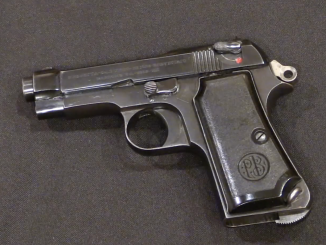The SITES Spectre was imported into the US primarily as a semiautomatic pistol – but it was really designed to be an SMG. It has an interesting closed-bolt fire control system, and in SMG for a metal top folding stock. Thanks to DSA, I have the opportunity to take one of these out to the range to try out!
Here’s my previous video on the pistol version:



so, did the SMG have the forced air cooling?
According to http://modernfirearms.net/en/submachine-guns/italy-submachine-guns/spectre-m4-eng/
The bolt is so designed that it acts as an air pump to push air through the barrel shroud and provide additional cooling for the barrel and action.
Has there ever been a system that actually accomplished this effectively…? I know that a lot of folks have claimed that the Lewis Gun and the Pecheneg managed it, but I’m afraid that the reality is probably that the added barrel mass has rather more to do with it seeming to work on those systems…
I mean, for the love of God, you have to have something like an aircraft slipstream at fairly high speed in order to make really effective air cooling, and I just don’t see that coming from a reciprocating bolt mass pushing air.
I would really love to see a Mythbuster’s sort of take on this, with pyrometers and all the attendant instrumentation looking at the actual facts.
Do as you wish, but observe that in case of Pecheneg cooling system was used to increase barrel life to 25000 shots, which is more than 2 times in case of PKM and now 10000 shots could be fired in 1 hour without excessive spread. Life of others parts was also extended 2 or so times.
https://militaryarms.ru/oruzhie/pulemety/pecheneg/
Modern metallurgy will most certainly also helped with the extended lifespan of the barrels. But I would most certainly be interested in tests to show if the barrel cooling works as advertised or not as well. OTOH we have seen quite a few Pecheneg machine guns being used with normal PKM and PKT barrels even. Maybe a supply issue of missing replacement parts or the barrel design is not as good as it is supposed to be?
Lewis worked by muzzle blast and the venturi effect . not bolt movement .
Still the same idea… You do the equations, and they’re all hoping that you’re somehow going to remove all that heat from things via tapping energy off the operating mechanism of the weapon, which I fervently believe is a mug’s game. It’s the equivalent of a perpetual motion machine; the numbers just don’t add up, and if they did, you’d likely zero out the energy used to propel the projectile in the first damn place…
I can’t remember where I saw it, but there’s a fairly well-done refutation of the whole Lewis Gun system that pretty much spells out it being the cooling equivalent of the Blish Lock. Yeah, it does do a little bit to help, but overall? It’s a waste of manufacturing time and material. The guy who did it came to the conclusion that the equivalent weight of that fin system in a steel barrel would have produced better and far cheaper results…
These were all theoretical calculations, and I don’t think they were ever really validated experimentally. I think it might be worthwhile for someone to actually run those experiments, but that’s just me. I suspect that better metallurgy will make the entire issue moot, in a few years.
Every air-cooled car/truck engine (bikes work differently) uses a forced air cooling system. Part of the power of the engine is used to force the air through the cooling fins.
The system works.
And theoretically a gun, contrary to an automotive engine, has a lot of spare energy to use (only a minimal part of the recoil-gas energy is used to cycle the gun).
BUT those systems add weight and complexity, and that’s incompatible with a portable weapon (hence shortcuts like using the blast, or the movement of the bolt).
AND, engines actually RUN. A portable mg, even in action, doesn’t fire for most of the time. So, for most of the time, the forced-air cooling doesn’t do anything. That’s the limit of those systems. For most of the time the barrel cool off exactly like a normal barrel would.
As for the Pecheng, Russians have quite an history of wild claims about the capabilities of their new toys. I’m waiting for confirmations.
As I have wrote five years ago, I have already made a quick search in the patents US4469006 & US4589218: there is not a single word about cool(ing), heat, shroud in these.
As we can see, the receiver and the barrel shroud is one part, maybe made from closed profile. The bolt fits in the profile, and acts as a piston, like in a pneumatic cylinder or bicycle pump: it sucks and presses air through the bore of the barrel and the openings of the barrel shroud during its movement.
The question is: can be made the bolt and the receiver with such a tight fitting, which can move the air, and the gun’s operation is still reliable?
Or – and probably – it is just a myth, which originates from marketing and/or misunderstanding, repeated over and over again, thus creating its own references and creditibility.
I’ve always been interested in the Spectre. Why wasn’t it more widely adapted?
1) Because SNG’s are obsolete and have been so since the introduction of the assault rifle
2) Explain what this does better than a PPS-43, M3A! or Sterling to pick some designs at random
SMG for SNG – finger check
Really disappointing about the selector switch design. It must be missing a detent or something.
It’s not the design, but likely 35 years of overuse that loosened something.
if they take all that plastic off, it will stop rotating. gravity assist.
The selector is moving when you let off of the trigger.
Yupp, looks like something drags it forward with the trigger. Maybe a cleaning is in order so that the pin that the trigger and safety sit on does not move the safety switch.
Takes me back to playing Goldeneye on the N64. The Phantom smg in that game is based off this.